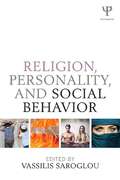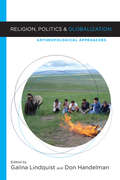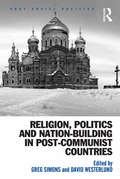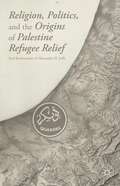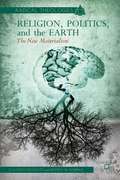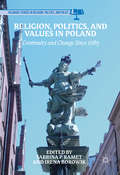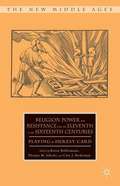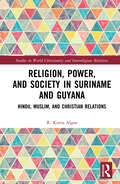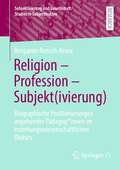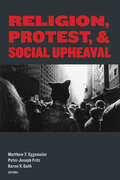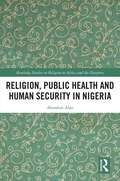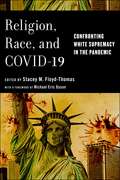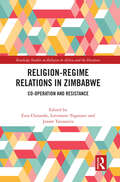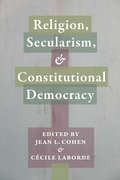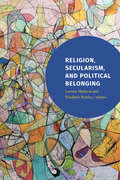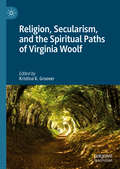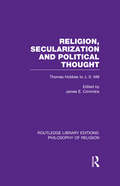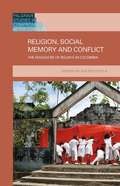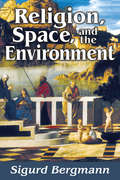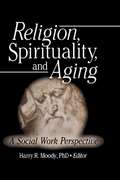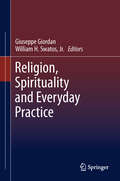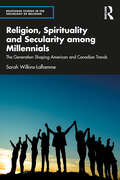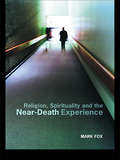- Table View
- List View
Religion, Personality, and Social Behavior
by Vassilis SaroglouPsychological interest in religion, in terms of both theory and empirical research, has been constant since the beginning of psychology. However, since the beginning of the 21st Century, partially due to important social and political events and developments, interest in religion within personality and social psychology has increased. This volume reviews the accumulated research and theory on the major aspects of personality and social psychology as applied to religion. It provides a high quality integrative, systematic, and rigorous review of that work, with a focus on topics that are both central in personality and social psychology and have allowed for the accumulation of solid and replicated and not impressionist knowledge on religion. The contributors are renowned researchers in the field who offer an international perspective that is both illuminating, yet neutral, with respect to religion. The volume’s primary audience are academics, researchers, and advanced students in social psychology, but it will also interest those in sociology, political sciences, and anthropology.
Religion, Politics, And Globalization: Anthropological Approaches (Berghahn Ser.)
by Don Handelman GalinaWhile social scientists, beginning with Weber, envisioned a secularized world, religion today is forthrightly becoming a defining feature of life all around the globe. The complex connections between religion and politics, and the ways in which globalization shapes these processes, are central themes explored in this volume by leading scholars in the field of religion. Does the holism of numerous past and present day cosmologies mean that religions with their holistic orientations are integral to human existence? What happens when political ideologies and projects are framed as transcendental truths and justified by Divine authority? How are individual and collective identities shaped by religious rhetoric, and what are the consequences? Can mass murder, deemed terrorism, be understood as a form of ritual sacrifice, and if so, what are the implications for our sensibilities and practices as scholars and citizens? Using empirical material, from historical analyses of established religions to the everyday strife of marginalized groups such as migrants and dissident movements, this volume deepens the understanding of processes that shape the contemporary world.
Religion, Politics and Nation-Building in Post-Communist Countries (Post-Soviet Politics)
by Greg Simons David WesterlundThe increasing significance and visibility of relationships between religion and public arenas and institutions following the fall of communism in Europe provide the core focus of this fascinating book. Leading international scholars consider the religious and political role of Christian Orthodoxy in the Russian Federation, Romania, Georgia and Ukraine alongside the revival of old, indigenous religions, often referred to as 'shamanistic' and look at how, despite Islam’s long history and many adherents in the south, Islamophobic attitudes have increasingly been added to traditional anti-Semitic, anti-Western or anti-liberal elements of Russian nationalism. Contrasts between the church’s position in the post-communist nation building process of secular Estonia with its role in predominantly Catholic Poland are also explored. Religion, Politics and Nation-Building in Post-Communist Countries gives a broad overview of the political importance of religion in the Post-Soviet space but its interest and relevance extends far beyond the geographical focus, providing examples of the challenges in the spheres of public, religious and social policy for all transitional countries.
Religion, Politics, And The Origins Of Palestine Refugee Relief
by Asaf Romirowsky Alexander H. JoffeThis book examines the leading role of the Quaker American Friends Service Committee in the United Nations relief program for Palestine Arab refugees in 1948-1950 in the Gaza Strip. Using archival data, oral histories, and biographical accounts, it provides a detailed look at internal decision-making in an early non-governmental organization.
Religion, Politics, and the Earth
by Clayton Crockett Jeffrey W. Robbins"Following Vattimo's postmodern philosophy, Badiou's postmetaphysical ontology, and i ek's revolutionary style, the authors of this marvelous book invites us to reactivate our politics of resistance against our greatest enemy: corporate capitalism. The best solution to the ecological, energy, and financial crisis corporate capitalism has created, as Crockett Clayton and Jeffrey Robbins suggest, is a new theological materialism where Being is conceived as energy both subjectively and objectively. All my graduate students will have to read this book carefully if they want to become philosophers. " - Santiago Zabala, ICREA Research Professor at the University of Barcelona "This is a book of an extraordinary timeliness, written in an accessible and strikingly informative way. It is excellently poised to become a synthetic and agenda setting statement about the implications of a new materialism for the founding of a new radical theology, a new kind of spirituality. I consider this therefore quite a remarkable book which will be influential in ongoing discussions of psychoanalysis, continental philosophy, and theology. Moreover, it will be, quite simply, the best book about spirituality and the new materialism on the market today. While all of the work of the new materialists engage at one level or another the question of a new spirituality, I do not think there is anything comparable in significance to what Crockett and Robbins have provided here. " - Ward Blanton, University of Kent "This book will perhaps be most appreciated by the reader with an intuitive cast of mind, able to recognize the force of an argument in its imaginative suggestiveness . . . New Materialism is about energy transformation, we are told, energy which cannot be reduced to matter because it resonates with spirit and life . . . Yet the book strikes a fundamental note of hard reality: 'if we want our civilization to live on earth a little longer we will have to recognize our coexistence with and in earth'. " - Christian Ecology Link
Religion, Politics, and Values in Poland: Continuity and Change Since 1989 (Palgrave Studies in Religion, Politics, and Policy)
by Sabrina P. Ramet and Irena BorowikThis volume brings together leading scholars to examine how the Church has brought its values into the political sphere and, in the process, alienated some of the younger generation. Since the disintegration of the communist one-party state at the end of the 1980s, the Catholic Church has pushed its agenda to ban abortion, introduce religious instruction in the state schools, and protect Poland from secular influences emanating from the European Union. As one of the consequences, Polish society has become polarized along religious lines, with conservative forces such as Fr. Rydzyk’s Radio Maryja seeking to counter the influence of the European Union and liberals on the left trying to protect secular values. This volume casts a wide net in topics, with chapters on Pope John Paul II, Radio Maryja, religious education, the Church’s campaign against what it calls “genderism,” and the privatization of religious belief, among other topics.
Religion, Power, And Resistance From The Eleventh To The Sixteenth Centuries
by Karen Bollermann Thomas M. Izbicki Cary J. NedermanAddressing the myriad ways in which heresy accusations could fulfill political aims during the Middle Ages, this collection shows acts of heresy were not just influenced by religion. Essays examine individual cases, in addition to the close relationship of orthodoxy and political dominance in medieval games of power.
Religion, Power, and Society in Suriname and Guyana: Hindu, Muslim, and Christian Relations (Studies in World Christianity and Interreligious Relations)
by R. Kirtie AlgoeThis book surveys the development of the religious landscape in Suriname and Guyana, focusing on the interaction between Hindus, Muslims, and Christians and responses to Christian dominance. It reflects on how and why these religiously diverse Caribbean societies are characterized by relative harmony, whereas interreligious relationships in other parts of the world have been marked by extreme conflict and violence. The chapters explore ideological and institutional dimensions, including the role of government policies, religious demography, religious leadership, and private religious institutions. The author takes a critical stance towards a negative approach to power struggles and offers a perspective that does not necessarily consider religious diversity a hindrance for religious harmony. Making valuable data accessible to scholars in the English language, this volume provides a framework for the study of interreligious relations and for understanding the religious worlds of the Caribbean.
Religion - Profession - Subjekt: Biographische Positionierungen angehender Pädagog*innen im erziehungswissenschaftlichen Diskurs (Subjektivierung und Gesellschaft/Studies in Subjectivation)
by Benjamin Rensch-KruseDie vorliegende qualitativ-empirische Studie untersucht religiöse Orientierungen von Student:innen der Erziehungswissenschaften und der Lehrämter. Sie geht der noch nicht erforschten Frage nach, wie angehende Pädagog:innen ihre Religiosität mit Wissensinhalten ihres Studiums biographisch vermitteln und inwiefern dabei Subjektivierungseffekte eine Rolle spielen. Anhand einer Verknüpfung von Biographie- und Diskursanalyse werden übergeordnete kollektive Wissensordnungen in den Blick genommen, die im Kontext religionsbezogener und professionalisierungsspezifischer Diskurse zirkulieren und deren Analyse Hinweise darauf gibt, wie sich Student:innen im Spannungsfeld diskursiver Ordnungsstrukturen positionieren. Solcherart gibt die Studie Einblicke in Prozesse, die als Subjektivierungs- bzw. Professionalisierungsmomente gelesen werden können
Religion, Protest, and Social Upheaval
by Mary Doak Nichole Flores Ju Hui Han Kwok Pui-Lan Zayn Kassam Jermaine McDonald Donovan O. Schaefer Devin Singh C. Melissa Snarr Mark Lewis TaylorRepresents some of the best, cutting-edge thinking available on multiple forms of social upheaval and related grassroots movements.From the January 2017 Women’s March to the August 2017 events in Charlottesville and the 2020 protests for racial justice in the wake of George Floyd’s murder, social upheaval and protest have loomed large in the United States in recent years. The varied, sometimes conflicting role of religious believers, communities, and institutions in such events and movements calls for scholarly analysis. Arising from a conference held at the College of the Holy Cross in November 2017, Religion, Protest, and Social Upheaval gathers contributions from ten scholars in religious studies, theology and ethics, and gender studies—from seasoned experts to emerging voices—to illuminate this tumultuous era of history and the complex landscape of social action for economic, racial, political, and sexual and gender justice.The contributors consider the history of resistance to racial capitalist imperialism from W. E. B. Du Bois to today; the theological genealogy of the capitalist economic order, and Catholic theology’s growing concern with climate change; affect theory and the rise of white nationalism, theological aesthetics, and solidarity with migrants; differing U.S. Christian churches’ responses to the “revolutionary aesthetics” of the Black Lives Matter movement; Muslim migration and the postsecular character of Muslim labor organizing in the United States; shifts in moral reasoning and religiosity among U.S. women’s movements from the 1960s to today; and the intersection of heresy discourse and struggles for LGBTQ+ equality among Korean and Korean-American Protestants. With this pluralistic approach, Religion, Protest, and Social Upheaval offers a snapshot of scholarly religious responses to the crises and promises of the late 2010s and early 2020s. Representing the diverse coalitions of the religious left, it provides groundbreaking analysis, charts trajectories for further study and action, and offers visions for a more hopeful future.
Religion, Public Health and Human Security in Nigeria (Routledge Studies on Remote Places and Remoteness)
by Abiodun AlaoThis book critically examines the intersection of religion, public health and human security in Nigeria. Focusing on Christianity, Islam, traditional religions and "intra-religious" doctrinal divergencies, the book explores the impact faith has on health-related decisions and how this affects security in Nigeria. The book assesses the connection between religion and five contemporary major health and medical issues in the country. This includes the issue of epidemics and pandemics such as the Covid-19 pandemic, vaccines, contraception, blood transfusion and the controversies associated with "miracle healing". In particular, the book explores situations where individuals have the power of choice but instead, embraces faith and religious positions that contradict science in the management of their health and, in the process, expose themselves and others to personal health insecurity. It investigates aspects of human security including the wider international ramifications of health issues, approaches to cures and the interpretation of causes of diseases, as well as the ethno-religious connotations of such interpretations. Exploring key issues that have brought religion into the politics of health and human security in Nigeria, this book will be of interest to students and scholars in the field of African Religion, African Politics, African Studies, public health, security, and Sociology.
Religion, Race, and COVID-19: Confronting White Supremacy in the Pandemic (Religion and Social Transformation)
by Stacey M. Floyd-ThomasExamines how the dynamics emerging from the pandemic affect our most vulnerable populations and shape a new religious landscapeThe COVID-19 pandemic upset virtually every facet of society and, in many cases, exposed gross inequality and dysfunction. The particular dynamics emerging from the coronavirus pandemic have been felt most intensely by America’s most vulnerable populations, who are disproportionately people of color and the working poor, the people whom the Bible refers to as “the least of these.”This book makes the case that the pandemic was not just a medical phenomenon, or an economic or social one, but also a religious one. Religious practice has been altered in profound ways. Controversies around religious freedom have been re-ignited over debates concerning whether government can restrict church services. Christian white supremacists not only defied shelter in place orders, but found new ways to propagate racist attacks, with their White Christian identity fueling their reactions to the pandemic. Some religious leaders, including those in communities of color, saw the virus as an indicator of God’s wrath, or as a divine test, and viewed altering their traditional practices to mitigate the virus’s spread as a weakening of faith.Religion, Race, and COVID-19 argues that there is a religious hierarchy in US society that puts “the least of these” last while prioritizing those who benefit most from white privilege. Yet these vulnerable populations draw on theological and religious resources to contend with these existential threats. The volume shows how social transformation occurs when faith is both formed and informed during crises, offering compelling insight into the saliency and lasting impact of religiosity within human culture.
Religion, Race, and the Making of Confederate Kentucky, 1830-1880
by Luke E. HarlowThis book sheds new light on the role of religion in the nineteenth-century slavery debates. In it, Luke E. Harlow argues that ongoing conflict over the meaning of Christian "orthodoxy" constrained the political and cultural horizons available for defenders and opponents of American slavery. The central locus of these debates was Kentucky, a border slave state with a long-standing antislavery presence. Although white Kentuckians famously cast themselves as moderates in the period and remained with the Union during the Civil War, their religious values showed no moderation on the slavery question. When the war ultimately brought emancipation, white Kentuckians found themselves in lockstep with the rest of the Confederate South. Racist religion thus paved the way for the making of Kentucky's Confederate memory of the war, as well as a deeply entrenched white Democratic Party in the state.
Religion, Redemption and Revolution
by Wayne CristaudoReligion, Redemption, and Revolution closely examines the intertwined intellectual development of one of the most important Jewish thinkers of the twentieth century, Franz Rosenzweig, and his friend and teacher, Christian sociologist Eugen Rosenstock-Huessy. The first major English work on Rosenstock-Huessy, it also provides a significant reinterpretation of Rosenzweig's writings based on the thinkers' shared insights -- including their critique of modern Western philosophy, and their novel conception of speech.This groundbreaking bookprovides a detailed examination of their 'new speech thinking' paradigm, a model grounded in the faith traditions of Judaism and Christianity. Wayne Cristaudo contrasts this paradigm against the radical liberalism that has dominated social theory for the last fifty years. Religion, Redemption, and Revolution provides powerful arguments for the continued relevance of Rosenzweig and Rosenstock-Huessy's work in navigating the religious, social, and political conflicts we now face.
Religion-Regime Relations in Zimbabwe: Co-operation and Resistance (Routledge Studies on Religion in Africa and the Diaspora)
by Ezra Chitando Lovemore Togarasei Joram TarusariraThis book explores religion-regime relations in contemporary Zimbabwe to identify patterns of co-operation and resistance across diverse religious institutions. Using co-operation and resistance as an analytical framework, the book shows how different religious organisations have interacted with Emmerson Mnangagwa’s "Second Republic", following Robert Mugabe’s departure from the political scene. In particular, through case studies on the Zimbabwe Council of Churches, Zimbabwe Catholic Bishops Conference and Pentecostals, African Traditional Religions, Islam, and others, the book explores how different religious institutions have responded to Mnangagwa’s new regime. Chapters highlight the complexities characterising the religion-regime interface, showing how the same religious organisation might co-operate and resist at the same time. Furthermore, the book compares how religious institutions co-operated or resisted Mugabe’s earlier regime to identify patterns of continuity and change. Overall, the book highlights the challenges of deploying simplistic frames in efforts to understand the interface between politics and religion. A significant contribution to global scholarship on religion-regime interfaces, this book will appeal to academics and students in the field of Religious Studies, Political Science, History and African Studies
Religion, Secularism, and Constitutional Democracy (Religion, Culture, and Public Life #20)
by Cécile Laborde Jean CohenPolarization between political religionists and militant secularists on both sides of the Atlantic is on the rise. Critically engaging with traditional secularism and religious accommodationism, this collection introduces a constitutional secularism that robustly meets contemporary challenges. It identifies which connections between religion and the state are compatible with the liberal, republican, and democratic principles of constitutional democracy and assesses the success of their implementation in the birthplace of political secularism: the United States and Western Europe.Approaching this issue from philosophical, legal, historical, political, and sociological perspectives, the contributors wage a thorough defense of their project's theoretical and institutional legitimacy. Their work brings fresh insight to debates over the balance of human rights and religious freedom, the proper definition of a nonestablishment norm, and the relationship between sovereignty and legal pluralism. They discuss the genealogy of and tensions involving international legal rights to religious freedom, religious symbols in public spaces, religious arguments in public debates, the jurisdiction of religious authorities in personal law, and the dilemmas of religious accommodation in national constitutions and public policy when it violates international human rights agreements or liberal-democratic principles. If we profoundly rethink the concepts of religion and secularism, these thinkers argue, a principled adjudication of competing claims becomes possible.
Religion, Secularism, and Political Belonging
by Leerom Medovoi and Elizabeth BentleyWorking in four scholarly teams focused on different global regions—North America, the European Union, the Middle East, and China—the contributors to Religion, Secularism, and Political Belonging examine how new political worlds intersect with locally specific articulations of religion and secularism. The chapters address many topics, including the changing relationship between Islam and politics in Tunisia after the 2010 revolution, the influence of religion on the sharp turn to the political right in Western Europe, understandings of Confucianism as a form of secularism, and the alliance between evangelical Christians and neoliberal business elites in the United States since the 1970s. This volume also provides a methodological template for how humanities scholars around the world can collaboratively engage with sweeping issues of global significance.Contributors. Markus Balkenhol, Elizabeth Bentley, Kambiz GhaneaBassiri, David N. Gibbs, Ori Goldberg, Marcia Klotz, Zeynep Kurtulus Korkman, Leerom Medovoi, Eva Midden, Mohanad Mustafa, Mu-chou Poo, Shaul Setter, John Vignaux Smith, Pooyan Tamimi Arab, Ernst van den Hemel, Albert Welter, Francis Ching-Wah Yip, Raef Zreik
Religion, Secularism, and the Spiritual Paths of Virginia Woolf
by Kristina K. GrooverReligion, Secularism, and the Spiritual Paths of Virginia Woolf offers an expansive interdisciplinary study of spirituality in Virginia Woolf's writing, drawing on theology, psychology, geography, history, gender and sexuality studies, and other critical fields. The essays in this collection interrogate conventional approaches to the spiritual, and to Woolf’s work, while contributing to a larger critical reappraisal of modernism, religion, and secularism. While Woolf’s atheism and her sharp criticism of religion have become critical commonplaces, her sometimes withering critique of religion conflicts with what might well be called a religious sensibility in her work. The essays collected here take up a challenge posed by Woolf herself: how to understand her persistent use of religious language, her representation of deeply mysterious human experiences, and her recurrent questions about life's meaning in light of her disparaging attitude toward religion. These essays argue that Woolf's writing reframes and reclaims the spiritual in alternate forms; she strives to find new language for those numinous experiences that remain after the death of God has been pronounced.
Religion, Secularization and Political Thought: Thomas Hobbes to J. S. Mill (Routledge Library Editions: Philosophy of Religion)
by James E. CrimminsThe increasing secularization of political thought between the mid-seventeenth and mid-nineteenth centuries has often been noted, but rarely described in detail. The contributors to this volume consider the significance of the relationship between religious beliefs, dogma and secular ideas in British political philosophy from Thomas Hobbes to J.S. Mill. During this period, Britain experienced the advance of natural science, the spread of education and other social improvements, and reforms in the political realm. These changes forced religion to account for itself and to justify its existence, both as a social institution and as a collection of fundamental articles of belief about the world and its operations. This book, originally published in 1990, conveys the crucial importance of the association between religion, secularization and political thought.
Religion, Social Memory and Conflict
by Sandra Milena Rios OyolaThe field of transitional justice and reconciliation considers social memory to be an important mechanism for acknowledging the violation of victims' rights and a step toward building peace. Societies in conflict, such as Colombia, challenge our current understanding of using memory in the construction of social peace processes, which in turn question the impossibility of forgiving violence that is still to come. Drawing on original ethnographical research, Rios analyses strategies of memorialization after the massacre of Bojay#65533;, Colombia, as an arena of political contention but also of grassroots resistance to persistent and diverse forms of violence. The book focuses on the work of the local grassroots Catholic Church and of the victims' association ten years after the massacre of Bojay#65533;. It explores the role of religion in the management of victims' emotions and in supporting claims of transitional justice from a grassroots perspective in a context of thin political transition.
Religion, Space, and the Environment
by Sigurd BergmannReligions often nurture important skills that help believers locate themselves in the world. Religious perceptions, practices, emotions, and beliefs are closely interwoven with the environments from which they emerge. Sigurd Bergmann's driving emphasis here is to explore religion not in relation to, but as a part of the spatiality and movement within the environment from which it arises and is nurtured.Religion, Space, and the Environment emerges from the author's experiences in different places and continents over the past decade. At the book's heart lie the questions of how space, place, and religion amalgamate and how lived space and lived religion influence each other.Bergmann explores how religion and the memory of our past impact our lives in urban spaces; how the sacred geographies in Mayan and northeast Asian lands compare to modern eco-spirituality; and how human images and practices of moving in, with, and through the land are interwoven with the processes of colonization and sacralising, and the practices of power and visions of the sacred, among other topics.
Religion, Spirituality, and Aging: A Social Work Perspective
by Harry R MoodyLearn how to make a more positive impact with your social work with the agedReligion is an important coping mechanism for many aging adults. Religion, Spirituality, and Aging: A Social Work Perspective presents the latest research that shows how religion and spirituality can improve quality of life for elders. Respected social work researchers and scholars provide insight and practical methods for fostering positive aging while also considering how spirituality and religion can affect practitioners themselves. The full range of advantages and ethical implications are discussed in clear detail from a social work viewpoint. Case studies plainly illustrate the positive impact that the inclusion of spirituality and religion in an aging person&’s life may have on their physical and mental welfare.Organized social work in the early twentieth century actively tried to distance itself from its roots as a form of religious charity in favor of becoming a scientific and professional endeavor. Religion, Spirituality, and Aging once again bridges the gap between social work and spiritual matters by presenting penetrating articles that discusses the issues of the aging soul while examining ways to improve care. Creative strategies are offered to contribute to the spiritual side of aging while considering every implication and ethical question. The compilation is extensively referenced and includes helpful figures and tables to clearly illustrate data and ideas.Religion, Spirituality, and Aging discusses: the latest social work trends and attitudes toward spirituality prayer, meditation, and acts of altruism as interventions an empirical study of how social workers use religion and spirituality as an intervention ethical considerations and best practices religion and spirituality during long-term care the "Postcards to God" project dreams and their relationship to the search for meaning in later life a spiritual approach to positive aging through autobiography dementia and spirituality creating new rituals for sacred aging spiritual master Henri Nouwen&’s principles of aging-and his approaches to caring for older people an interview study on elders&’ spirituality and the changes manifested in their views of religionReligion, Spirituality, and Aging is a remarkable reminder that elders are our future selves. This erudite, well-reasoned examination of aging and spirituality from a social work perspective is crucial reading for social workers, human service professionals who work with the aged, and gerontology scholars.
Religion, Spirituality and Everyday Practice
by William H. Swatos Jr. Giuseppe GiordanThe current generation of young adults, at least in the Western world, has shown a marked tendency toward a preference for describing themselves as "spiritual" as contrasted to "religious." This book seeks to examine the possible meanings and consequences associated with this contrast in terms of the similarities and differences that affect those who use these terms with respect to the everyday practices that they themselves employ or believe should follow from being self-defined as "religious" or "spiritual" - or not. The several chapters in this volume take up the religious-spiritual contrast specifically through investigations into practice: In what ways do people who claim to be "religious" or "spiritual" define these self-images as manifest in their own lives? How on a daily basis does a person who considers himself or herself "religious" or "spiritual" live out that self-image in specific ways that she or he can describe to others, even if not share with others? Are there ways that being "spiritual" can involve religion or ways that being "religious" can involve spirituality, and if so, how do these differ from concepts in prior eras (e.g., Ignatian spirituality, Orthodox spirituality, Anglican spirituality, etc.)? We also explore if there are institutions of spiritual practice to which those who term themselves "spiritual" turn, or if the difference implied by these terms may instead be between institutionalized and de-institutionalized expressions of practice, including but not limited to self-spiritualities.
Religion, Spirituality and Secularity among Millennials: The Generation Shaping American and Canadian Trends (Routledge Studies in the Sociology of Religion)
by Sarah Wilkins-LaflammeThis book explores the world of religion, spirituality and secularity among the Millennial generation in the United States and Canada, with a focus on the ways Millennials are doing (non)religion differently in their social lives compared with their parents and grandparents. It considers the influences exercised on the (non)religious and spiritual landscapes of young adults in North America by the digital age, precarious work, growing pluralism, extreme individualism, environmental crisis, advanced urbanism, expanded higher education, emerging adulthood, and a secular age. Based on extensive primary and secondary quantitative data, complemented with high-quality qualitative research, including interviews and focus groups, this book offers cross-national comparisons between the United States and Canada to highlight the impact of different social environments on the experience of religion, spirituality and secularity among the continent’s most numerous generation. As such, it will appeal to scholars of religion and sociology, with interests in religious and societal change as well as in religious practice among young adults.
Religion, Spirituality and the Near-Death Experience
by Mark FoxThis dramatic and sustained response to decades of research into near-death experiences (NDEs) is the first book to credibly bridge the gap between the competing factions of science and spirituality. Neither a religious argument touting NDEs as hard evidence for God, nor a scientific rebuke to religious interpretations, it balances investigation of these much-reported yet baffling phenomena, and brings fresh urgency to the study of our hopes for a life beyond.
